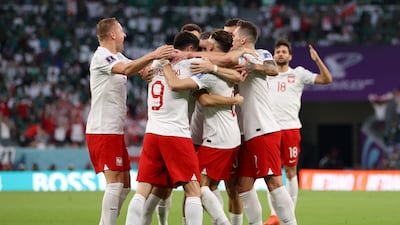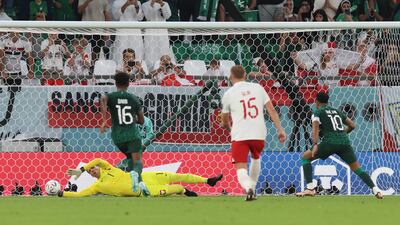Herve Renard, the manager of Saudi Arabia, let the phrase slip as he described the great shock of the World Cup so far. “Lionel Messi against Saudi Arabia,” he said, reflecting on why the 2-1 Saudi win that opened up Group C had resonated so widely. Argentina had been defeated; the fact it was "Messi’s Argentina" made it such a headline.
As the group goes into its last 90 minutes, three teams are left with their qualifying fate in their own hands. Or, if you measure it by how these contenders for a last-16 place are generally assessed, destiny is in the hands of two superstars – Messi and Robert Lewandowski – or the broad collective that is Saudi Arabia’s well-drilled side.
After Poland’s 2-0 win against Renard’s side preserved the cliffhanger balance of tonight’s last match day, he might just as easily have referred to his conquerors as “Lewandowski’s Poland”. The Polish skipper set up the first goal and scored the second.
Saudi Arabia have their outstanding individuals, established match-winners, such as Salem Al Dawsari, and rising talents like Firas Al Buraikan, but they have thrived on sound, shared habits skilfully channelled by Renard, a coach benefiting from the concentrated time many of the Saudi players spend together.
Nine of the starting line-up against Argentina are teammates at Al Hilal, reigning Asian club champions, footballers tuned to one another’s strengths, movements and instincts.
Any national manager who can graft on to his team the routines rehearsed, day in, day out, on a club practice pitch, is grateful. It gains him time, that most limited resource when you gather in national colours only for a few days, periods spread far apart in the calendar.
Preparation time for this World Cup has been especially limited, because it is squeezed into the middle of a club season.
Renard’s Al Hilal core had much of their homework already done. It shows. The defenders and goalkeeper – four out of five of them Al-Hilal colleagues – are tuned to one another’s positional instincts well enough that Saudi Arabia could dare to choreograph the high line that was so successful in taking the game to a stunned Argentina.
Just ask Messi or Lewandowski – who face off today with Argentina on three points, Poland on four – how far tried-and-tested club drills can carry team and about the limits of a lone megastar’s impact on his national team.
They have been serial collectors of individual awards – Messi eight times the top scorer in a Spanish Liga season, Lewandowski the same in seven different Bundesliga campaigns – and have watched, from afar, while the teammates who benefited from their stellar club contributions brought gold medals back from World Cups.
When Lewandowski joined Bayern Munich in the summer of 2014, the mood there was jubilant. Bayern’s players were naturally thrilled the best centre-forward in their league had left Borussia Dortmund to sign for them, but there was also a glow about the six Bayern players who had beaten Argentina in the Maracana stadium weeks earlier.
Another of the 2014 world champions, Toni Kroos, had been a Bayern midfielder until that summer; an eighth, Miroslav Klose, had spent an important portion of his career combining with the likes of Thomas Muller, Philipp Lahm and Bastian Schweinsteiger on the Bayern practice ground.
Argentina 1 Saudi Arabia 2: player ratings
Messi was only a silver-medallist that night in Rio de Janeiro. Four summers earlier, he was watching on television while seven of his then Barcelona colleagues won the World Cup final in a Spain jersey.
They played a pass-and-move style he recognised, down to its intricate details, as Barca’s, easily transposed into the national team by the likes of Andres Iniesta, Xavi, Gerard Pique, Sergio Busquets, Carles Puyol and Pedro.
A strong club core has been a feature of most World Cup-winning squads in the 21st century. When Italy won the World Cup in 2006, it was victory traced on the stripes of Juventus, where head coach Marcello Lippi had made his name as an elite manager, and where six of the players who shared in Italy’s victory in a taut final in Berlin were then employed.
Saudi Arabia’s Al Hilal cohort – 13 in the 26-man squad – are 90 minutes from taking the country into a first World Cup knockout phase since 1994. They face Mexico – who need a win, coupled with a setback for Argentina against Poland, to have any chance of qualifying – well used to big-game pressure.
Several have won two Asian Champions Leagues and contested a pair Club World Cup semi-finals in the past three years. Turn that knockout pedigree into a win and it means either Messi or Lewandowski will be going home, readying themselves only for the comforts of club football.


















































